The different responses to the “We are the 99 percent” movement are somewhat funny, though they are also a little bit heartbreaking and tragic for the level of cognitive dissonance they imply.
Recalling former Presidential candidate Mitt Romney’s famous gaffe that “47% of Americans were takers” (in the sense they were not paying taxes – not true), the self-declared “Mr. 53%” depicted here aimed to declare how he, by way of contrast, was not a taker (aka slacker/not “entitled”). He says he doesn’t blame Wall Street for the fact that, despite his being a veteran, he has had to struggle to work and pay for school. For him, these struggles are something akin to a badge of honor that he wears with pride.
For a different point of view, consider what this blogger has to say:
“I bet the Wall Street elite are thankful that they have some idiot kid with no sense of history willing to act as one of their brown-shirts if things start getting ugly in this new class war. There aren’t too many of the top 1% who are ex-military and a lot of liberals are afraid to death of former soldiers. I served too, and I’d like to tell this kid something. I didn’t serve in the military to protect a country that seems only out to make life better for the richest few.
If the conservative hero Ronald Reagan hadn’t slashed the living shit out of the GI Bill this kid would have had a lot easier time making it through college. He could have done it in four years while only working part-time. But Saint Ronnie said that government spending sucks so he made a complete mockery of educational benefits for veterans (while drastically increasing overall military spending). If you don’t believe me you can look it up. I was actually serving during the Reagan administration and luckily for me I had completed most of my degree before I enlisted.
And f*^ck you for calling people whiners who are fighting for the rights of the working class. I’d be the first to say that many of the Occupy Wall Street folks have their heads up their asses and don’t have much of an idea of what to do, but at least they are doing something. They are actually protesting so people like you don’t have to work like a 16th century peasant. I suppose that you think the early union organizers in America were whiners for trying to protect workers from the worst abuses of the industrial era. You should be ashamed of yourself instead of being so smug and high and mighty.
It was a huge government “bail-out” of returning WWII veterans that turned America into a country which actually created the idea of the middle class. Veterans were able to go to college and then buy home with VA loans. These men were mostly lower middle class deadbeats who would have never been able to afford a college education, much less buy a house. My father was one of those vets.
This was the United States government that did this, so be careful when you spew out shit from Rush Limbaugh criticizing the government. And perhaps you skipped the class on civics, but in a democracy we are the government. This means that if we don’t like something we can work to change it. If our elected officials aren’t carrying out our wishes, then we can protest our government. It’s legal and it’s in the constitution. Try reading it sometime instead of having some right-wing moron spoon-feed you their bizarre interpretation of our founding document.
Discusion Questions
Based on our diverse readings about the plight of the white working class, what do you think might explain why the people pictured here, who are proud to claim they are “making it” without government handouts? Why do you think they don’t question the fact that they are forced to work so hard for so little?
Why are poor and working class people content to see their children sent to fight in wars of choice in exchange for free education? Why don’t they demand that education without a service obligation? Why do they let their children expose themselves to physical harm and even death, without fighting for other service/policy options?
Do you think policy makers are hesitant to make education “free” in the United States, because they might lose out on “volunteers” for military service?

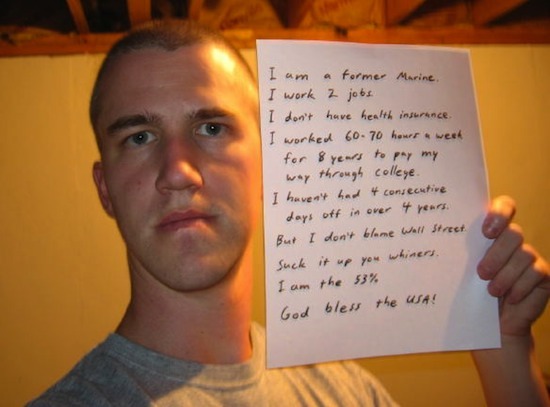
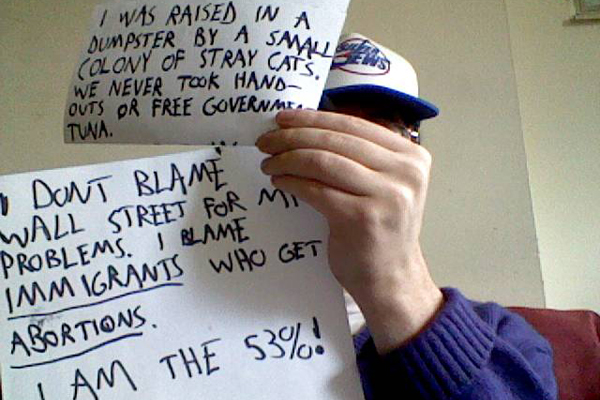

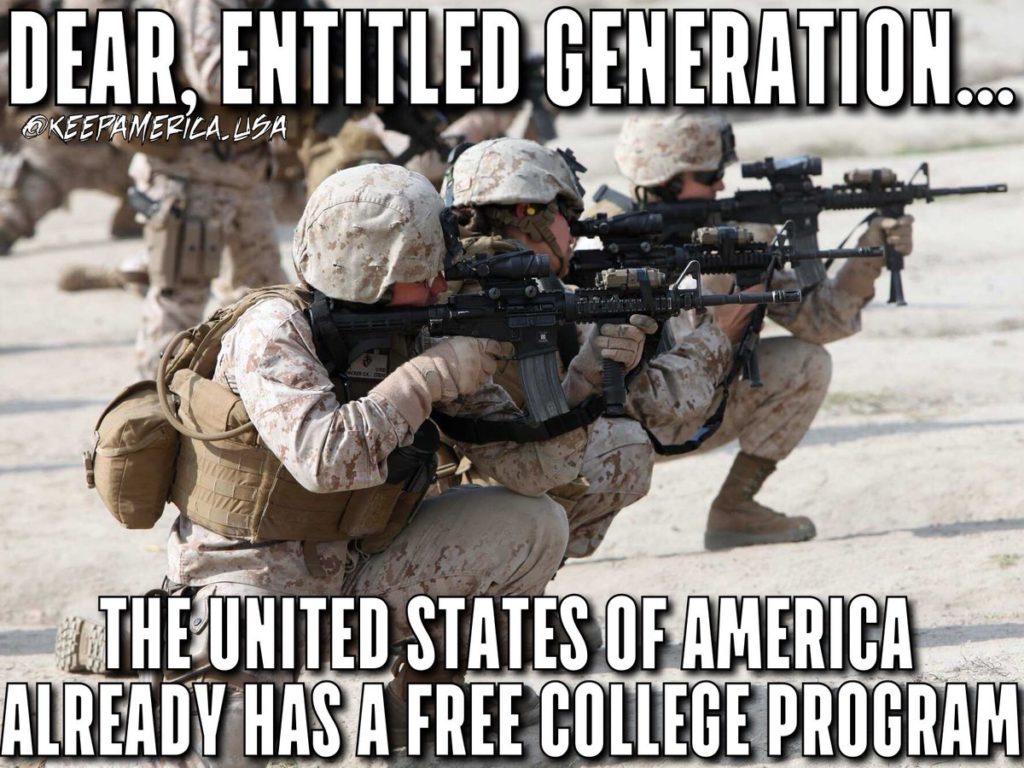
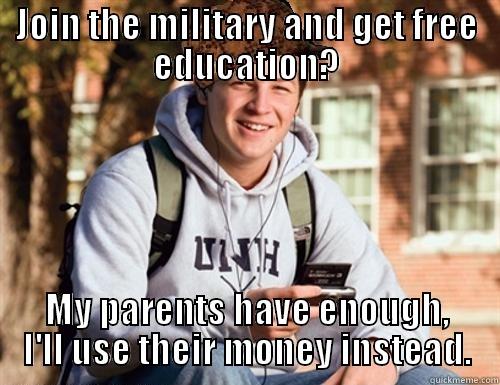
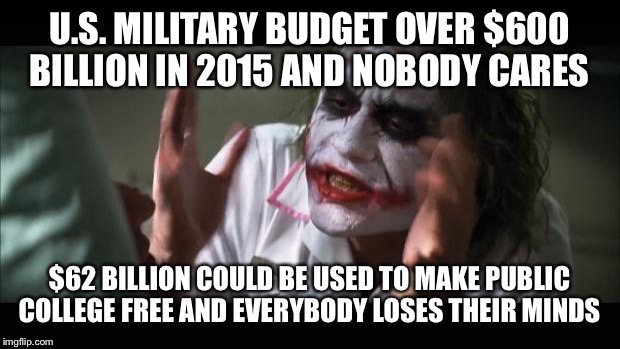
Personally I find it hard to believe that policy makers struggle to make education free in fear of losing military volunteers. Many people that serve in the military are doing so because it is a passion of theirs, in order to receive one of the highest forms of honor, or simply because they love their country and will do anything to preserve its values and prosperity. Military service is huge in my family. I have had countless relatives serve in the armed forces. Past generations served in order to honor their country and help out in anyway possible, while more recent generations of my family have enlisted for career opportunities. People should not see the armed forces as a “cop-out” or a way to pay for education but more as a vehicle in which you are able to better your life. The armed forces give countless opportunities for people to gain a higher level of education and explore the world. Serving in the armed forces takes guts and an impeccable work ethic.
I feel like policy makers try not to make education free in the United States because this would lead to a lesser amount of people volunteering for military services. For most people that volunteer for the military are doing it because it allows them to have the ability to receive a free education. Which benefits them because they may have not been able to financially afford an education elsewhere. Especially now a days that college tuition is expensive and difficult to afford for most people. It’s also crazy to think that the U.S military budget in 2015 was $600 billion but in order to make public education free that would only take $62 billion which is a small number compared to $600 billion. So i just find it interesting why can’t the government just take some of that money from the U.S military budget and just use it to make education free which would probably benefit our country in the long run. But I think policy makers won’t make education free because as i mentioned in the beginning this would lead to a lesser amount of people that would want to volunteer to military services because if education was free they wouldn’t have to go the military route in order to receive a free education.
I think I can understand the argument that policy makers are hesitant to make education “free” in the U.S. because they might lose out on volunteers for military service. However I feel it can only be a small percentage that this holds true. A larger argument is that the rich want to stay rich and keep the poor poor. If everyone had the same opportunity to attend renowned private schools like the rich send their kids to, then there would be more competition for jobs and success. I think law makers, who have money would prefer to keep education the way it is because it does not directly influence their life. There are many arguments as to why and why not lawmakers do not seem to want to fight for free education and ease of access of education. I honestly think it is correlated to socioeconomic status and the sustainability of those on top. I am interested to do more research on the topic.
The 53% want to be viewed differently in society. These 53% of people want to make a statement and show that they are not like the lower class, or the working class, and they most certainly will not be labeled as “white trash”. The fact that college isn’t free because we are in need for people to serve surprised me. I did not know that the prices of college factored into gaining military services.I have the utmost respect for people who choose to serve, and they are the strongest most courageous people in society. I do not agree that expensive colleges keep on increasing their prices in order to make it harder for people to attend college. Throughout today’s society, the cost of college has significantly increased, price of food, clothes, movie tickets, and gas. It seems as if society is making it impossible for us to live, and to pursue the things we enjoy in life.
I think that the 53% are claiming to be doing well and are trying to highlight their successes because they want to distinguish themselves and distance themselves from the lower class that are looked at as lazy and “white trash”. Prior to reading this article it never occurred to me that a reason the government doesn’t want to make college free is because they are afraid that it would cause a decrease in the numbers of people willing to go into the armed forces. Overall I think this is an interesting point because free college is a big incentive for many young men and women to serve our country.
This article definitely got me thinking more about the notion of the 53%. I feel like people associate “taking handouts” with being poor or lazy so that is why there is this huge notion to prove that they are neither of these. I think it is totally normal to be proud and outspoken for working hard for your money and these pictures seem to exaggerate that fact. I think one of the biggest problems that this article does talk about is the lack of resources for out veterans. I believe that after serving for the country things like the GI Bill were great and necessary. The fact that now we have so many veterans who are experiencing homelessness and having a very difficult time recieving education just feels like we have fallen short to those who gave up everything to serve this country. Also to see the numbers that we spend on the military it is just so astronomical and especially since now our current president is proposing to increase that budget even more but has not mentioned anything about increasing education.
I think that what might explain why the white working class is proud to claim that they are “making it” without handouts is that they feel that they don’t need anyone to help them strive. The idea of the fact that they are superior to most people makes them feel that if they were to take a handout from anyone it would make them feel less of themselves. The reason they don’t question the fact that they are forced to work so hard for so little is because they feel that if things were to change people besides the white working class will eventually advance in society leaving the white working class without their superiority. Poor and working class people are content to see their children sent to fight in wars of choice in exchange for free education because they feel like their children are making the right decision. This is because not only are they removing themselves from not the best situations at home but they are also providing themselves with an education that can help them build a better future. These people don’t demand education without service because they don’t think this is possible. They people that in the end, their children are in the process of creating a better future for themselves. Personally, I do believe policymakers are hesitant to make education free in the US because they might lose out on volunteers for the military service because education is the main reason why most people nowadays enter the military force.
I think that all people have an innate desire to be independent and express personal pride through their words and actions. It is more satisfying and even easier for people to simply make their claims, rather than fight for or demand different rights. I think this is sometimes why people don’t question the amount of work they put in compared to the little benefits. I think that people often don’t believe in the strength or power that their words could have in making a change or they don’t know what to do. Consequently, they just settle. I do think that in many cases the poor working class struggles to obtain the resources or opportunities to challenge or question the difficulties faced, but instead they decide to lock into the norm and status quo of society. In connection with the blogger response in the article, we are the government and so we should and can protest. If we don’t like something, there is legal opportunity to work for change.
I believe that the “53%” claim to be “making it” because they want to be associated with the rich, and not with “white trash”. They want to create some divide between themselves and people who rely more heavily on welfare and other “handouts” in order to point out how much better they are than the “takers”. They may not question the work that they’ve had to do because they think it’s a part of the American Dream; working two jobs just to get through college is just a part of working hard so that they can climb that ladder. The government enforces this idea by claiming that those who rely on welfare for a solid paycheck and immigrants who steal jobs are the real problems, not the governmental policies or cheap business tactics.
I also believe that the government doesn’t want to make education free for a lot of reasons. Losing out on volunteers for the military is one, but the cost of providing free education, since the price has skyrocketed, would be really high, and anyone could technically go to any college, meaning that the few with money might not be the only ones attending elite colleges anymore. Some people rely on military service to afford college, and to a lot of people, this is a very good option. Even I considered this heavily until I found out I was ineligible due to a health issue. If people could attend whatever college they wanted without concern for price, quite a few people would not put their lives at risk by joining the military, as their only incentive is gone.
After reading about the difficulties the white working class face, the people pictured in “We are the 53%” offer a different outlook on this working class. We have read about white privilege and I feel that these people pictured in this article are proud to claim that they are “making it” without government handouts to show that even though they are part of this class, they still are working hard to provide for themselves and their families. These veterans have seen fellow soldiers die and have participated in the violence overseas that most Americans only hear about through the news and media. I think that they have experienced so much battling in war that working when they return home does not phase them in the slightest. I believe that veterans do not question why they are forced to work so hard for so little because most of them feel that this is a minute problem compared to what they experienced at war. On the other hand, I do think that some veterans do believe they are not being treated fairly for their participation in the war. After sacrificing their lives to defend America, these veterans are not receiving any benefits. Veterans have fought for the country and they just come home to additional vigorous work to support their families. The fact that some veterans, like in this article, do not have health insurance after once putting their lives on the line for this country is mind-blowing.
I think that their pride in working so hard for so little is tied into the idea of the American Dream. It is all about working hard and being independent, so these people start to believe that no matter how difficult their situation is, as long as they are providing for themselves, they are ‘making it’. It also has a lot to do with the stigma behind accepting government aid. People aren’t seen as ‘really poor’ until they are accepting government aid, so these people believe that accepting the government’s help would be admitting to their own poverty. They also have a very stigmatized idea of what type of person accepts aid- usually poor, non-white, inner city people who don’t work and have a small classroom of children- and these people don’t want to have any association with the type of person they think accepts government aid. In reality, this isn’t the type of person who gets aid and these people would be better off with aid, but their pride doesn’t allow them to be associated with their ideas of “those people.”
I believe that the reason why the people pictured are so proud of so little is because they rather be associated with the rich 1%. They do not want to face the reality that because the government is so messed up, that people who are poor aren’t given an equal chance to get a good education or to get high paying jobs since they cannot pay for a degree. They are missing the fact that children go to war, put their lives at risk, and experience tragic events just to get a free education. Why is this something that Americans are proud of? It’s not something that we should be proud of. In fact, if someone says that they go into the miliatry so that they can pay for their education they are missing the point.
I think that US government is afraid to make education free because it would take away from military volunteers. Making education free would put every one on the same playing field for the most part. Equal opportunities for all is far to utopian for america. There are countless people in my opinion that are only in the military to receive a free education. They may disagree with things that america stands for but simply are using the military academies as a free means to an end. I believe that granting free education to everyone would take away from the volunteers. However i disagree, with america not making education free especially because we have the means to do it. The only thing free education could do is benefit society. More educated americans would make a more educated america.
I am surprised by this article. I never realized the irony that goes with the 53%. The men in the pictures are part of the poor but they are too “proud” to take hand-outs like the other 47%. These pictures seem like they are just trying to get the attention of the public to show that they are not lazy even though they are poor. I did not realize that because of Ronald Regan and the GI bill, it has made it so impossible for veterans to get their college degree. It is not fair how expensive college is and people should not have to be working multiple jobs just to get an education. Like we have mentioned in class, without a college degree it is so difficult to find a job, however, it is getting harder and harder to pay for it. If a undergraduate degree is the “norm” it should be made accessible to everyone and our country should use its money to help pay for it. The picture with the Joker resonates with me. It is hard to wrap your brain around the fact that $600 billion dollars goes into the military and a fraction of that ($62 billion) could make public college free. There are people in this country who need help and they should not be viewed as “takers”. Our country should focus on how it can better everyone and not just the top and wealthiest people.
I wonder if these same 53% supporters are in favor of higher retirement ages while working the same hours, shoddy health insurance, being severely at risk of homelessness and able to keep their “whining” to a minimum. People sometime have the idea that they are young and invincible or American and invicible, but thats unrealistic.
Knowing a Wall Street worker’s outfit is probably worth a semester including textbooks and their job is to exploit people, while other people (much like the first photo) are doing what might be considered “honest work” are paid pennies is something to REALLY think about, whine about and yell about. It seems whether a person is poor class, middle or upper class, there will always be a factor of stress or taking on a emotionless approach to get work done.
I find this a good representation of how the common American thinks: completely oblivious to what the real problem is and being proud of his own feats because it makes him “better” than/different from everyone else that didn’t do what he did. The blogger blames him for his complete lack of knowledge of what’s really going on, but my question is, can you really blame him? In this society, we’re taught to believe hard work=success and if you’re not successful, then you just didn’t work hard enough. We’re too busy trying to separate/differentiate ourselves from each other that we’re not noticing the bourgeois making easy money and causing this internal strife amongst the working class.
As for the last picture, I’m completely speechless. I can’t tell if it’s a joke or if he’s being serious. The amount of pride that you can almost literally feel dripping off the words on the papers he’s holding is repulsive. Yet another ignorant person who has no idea of what’s happening in the world and just pins it on a group of people that he thinks is lower than him.
Growing up in New York City and a veteran myself, I always found this ideological stance quite peculiar in the least, but also dangerous in the scheme of things. An overrepresentation of those I served with came from environments which celebrated individualism and hard work, especially internalizing the concept of pulling one’s self up by their own bootstraps. To even hint at limited upward mobility in the United States was absolutely unacceptable to most. The very idea would shake the foundations of their personality. Public assistance which targets the poor was reserved for societal low lives, losers and scammers to these individuals.
In my experience, military members today come from socioeconomically homogenous areas. These are communities which have limited interaction with people of different economic circumstance. Largely coming from rural or exurban communities, their experiences limited exposure with extreme economic inequality while forming a sense of normalcy in their own way of life. The assumption is made that everyone is dealt the same hand. This reality is compounded within the military culture, even celebrated.
Now, because so many military members feel as though they were able to achieve something, they look down upon all those who cannot. Failing to take into consideration their own advantages and structural forces which keep so many Americans impoverished. The danger here is that this narrative of American opportunity and victim blaming is easy to accept, even amongst the victims themselves. Veterans have significant influence in popular culture, within their communities and often have the power to shape policies. There is an overrepresentation of veterans in relation to the population serving in elected office across the nation and many if not most of these people feel this way. It’s so perverse in fact, that questioning this ideology in some circles is considered heresy.
I find this much more tragic than hilarious because of the extent of his young man’s cognitive dissonance. I guess he doesn’t see his exploitation and how greedy Wall Street types are affecting our economy. He can’t possibly think it’s ok for him to work two jobs and have no insurance after serving our country. And to call people working for change “whiners” – his signals are crossed. About the blogger who responded…he/she had a lot of interesting things to say, most of which I completely agree with (he/she sounds like one of my professors). I take exception with the blogger referring to returning WWII vets as “MOSTLY lower middle class deadbeats” – wow, does the blogger think any vet, deadbeat or otherwise, would have been undeserving of these benefits? That was a sweeping, harsh statement. A VA college loan and/or mortgage is the very least we can do for those who went through that hell. (My father was a Marine WWII vet and lived with untreated PTSD). The “deadbeat” term was not cool.
I agree with you in regards to the bloggers characterization of WWII vets, though he makes some other good points. Such is the wonderful and conflicted world of the Internet. In any case, I haven’t had time yet to develop more of a story line for this media post. But you are spot on in identifying his cognitive dissonance. Something interesting to think about is how it may very well be that economically precarious young men like this are fully cognizant of the fact they are virtually a stone’s throw distant from being lumped in with “poor” folk, so they engage in theatrics like this to differentiate themselves, almost shouting from the mountatin top – “look at me, I am poor, but still struggling and proud…I have a ‘work ethic’ so I am not like THOSE people.” The definintion of “those people,” of course, almost always summons the idea of people of color, immigrants, etc. In a society like ours that equates individual worth with having money, poor white males in particular come under pressure to maintain some level of self-worth, which many claim as a birth right. As Marx would say, the only thing they have that remains now is their labor. Hence, the appeals to “work ethic.”